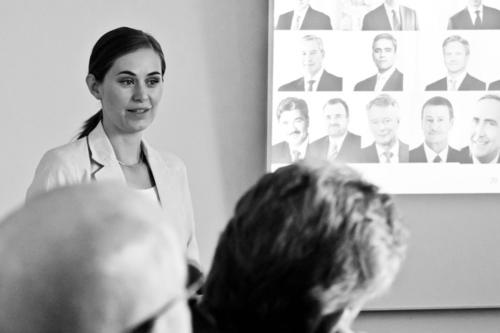A Dead-end Street
Organizational studies scholar Philine Erfurt has studied why the leadership of German businesses is still characterized by a particular type of manager
Jan 28, 2013
In her research for her doctoral dissertation at the Path Dependency Research Center, the graduate in business management, Philine Erfurt, identified a particular type of manager in German businesses.
Image Credit: Matthias Erfurt
He chats with colleagues about soccer during breaks in meetings, uses a company car, makes phone calls on a company phone, and works out at the same gym as employees. According to Philine Erfurt, that is a rough idea of the typical manager found at most German businesses, despite calls for greater diversity in the workforce. And he is also still employers’ preference. As part of her dissertation in the “Path Dependency” research training group at Freie Universität, junior scholar Erfurt studied why it is so difficult for employers to break free of conventional decision-making processes when hiring staff – and how to bring different perspectives to management levels.
They may preach diversity, but in the end, they stick to the pattern. Despite the firmly held conviction that employees should be chosen without regard for sex, origin, ethnicity, or religion, German businesses still tend to select the same type time and again. Philine Erfurt (29), who completed a master’s degree program in Gender Studies at the University of Sussex (UK) after studying in the Magister program in European Ethnology and Gender Studies at Humboldt-Universität zu Berlin, found out why in her dissertation, “Barriers to Change in Top Management Teams: The relevance of path dependence for homogenous leadership groups.”
“Hardly any area of life left that isn’t associated with the company”
In a one-year case study, organizational studies scholar Erfurt conducted interviews with salaried employees, observed meetings of the managing board, and assessed staffing selection criteria at a major consulting and service firm. She also performed a “network analysis,” a study of the network of formal and informal relationships within which employees move in their day-to-day work. Working out at the gym associated with the company is part of it, as is the company car, company cell phone – and yes, talking about soccer with colleagues. Erfurt says that in the end, there is hardly any area of employees’ life left that isn’t somehow associated with the company.
This phenomenon, which ultimately leads to standardization across management levels, is something the organizational studies scholar, who earned her doctorate at the Path Dependency Research Center calls hyper-inclusion. “It’s almost like there are invisible guardrails along the path you have to take to be successful at a company,” she says. The reason: “There are many more informal relationships than formal ones,” Erfurt says. Once an employee reaches a certain rung on the career ladder, there are no longer specific selection criteria, so whether a candidate gets ahead professionally is no longer decided based on qualifications, but above all based on “authenticity.” Anyone who doesn’t fit in, she says, doesn’t reach the top.
Dead-end Especially for Women Applicants and Employees
But that, Erfurt states, is exactly the dilemma facing employees, especially women. “If women are ‘typically feminine’ in their behavior, meaning that they are sensitive and show empathy, they are perceived as weak leadership figures. But if they adjust to be more like their male colleagues, those colleagues don’t see them as authentic.”
This leads to a disastrous dynamic, Erfurt says: Only employees who fit the pattern are chosen. Structures become more and more rigid, and leeway for making decisions dwindles. In path theory, this is known as a “lock-in”: repeated, often unconscious patterns leading to a dead end. “The system runs on auto-pilot, and the situation falls apart,” says Erfurt.
For the companies affected, this kind of path dependency can have dramatic consequences. Initiatives aimed at making changes fail, legitimation difficulties crop up, and customers take their business elsewhere. Not hiring more women in leadership positions, for example, damages only the companies themselves, says Erfurt. “It is no longer in fashion for a company not to have any women as its public face.” As a result, the mechanisms that have led to the rigid structures have to be changed – and that change has to come from the top down. “The management has to take charge,” Erfurt says. She concedes that the changes require the acceptance of all employees, but true change can only be sparked from the very top of the company. Or, that is, by an “exogenous shock,” a requirement imposed from outside. “A new law setting a quota for women’s representation, for example, could be that kind of external moment,” Erfurt says.
“Path Dependency” DFG Research Training GroupThe “Path Dependency” research training group, which is funded by the German Research Foundation (DFG), was founded in 2005. The group is hosted by the School of Business and Economics at Freie Universität Berlin. Doctoral candidates from various disciplines work within the group, completing their doctoral studies on topics that deal with “path dependency”: locked-in structures within a process or organizations from which it is difficult to break free. Since 2008, the DFG research training group has been a member of the Dahlem Research School, which encompasses many of the doctoral programs at Freie Universität. |
Further Information
Philine Erfurt; Freie Universität Berlin, DFG Research Training Group "Path Dependency," Tel.: +49 30 838-54052, Email: philine.erfurt@fu-berlin.de

